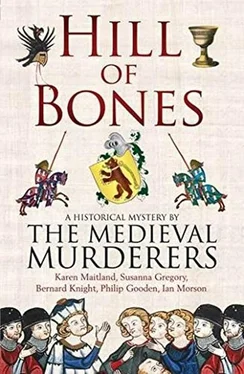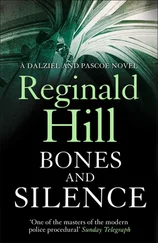The look of disgust on Martin’s face had been deepening all the time Edgar had been speaking, and now the lad turned to look at his master.
‘It’s all lies,’ William shouted, his face contorted. ‘You’re surely not going take his word over mine. Remember the miracles I’ve performed. I am Serkan, and he is… is nothing!’
‘Like me, you mean.’ The boy sprang to his feet. ‘I’m nothing to you either, am I? You let me think that you were a prophet, a holy man. I left my family, my village, everything, to follow you and all this time you’ve lied to me. Everything you’ve done has been nothing but cheap swindler’s tricks.’
Martin raised the dagger and ran at him, but William grabbed a handful of sulphur from the pot behind him and dashed into the lad’s face. Martin squealed, and blindly staggered backward. William reached out and grabbed his ankle, bringing him crashing to the ground. The knife flew from Martin’s hand.
William rolled onto his knees and crawled towards the blade. He stretched out his hand, but just as his fingertips touched it, a large leather boot came down on the dagger, pinning it to the ground.
William stared up. One of the sheriff’s men was looking down at him, his sword pointed straight at William’s throat. A second soldier had his sword pointed at Martin’s chest, an unnecessary precaution since he could do nothing except rub his streaming eyes.
Two men came panting over the rise. The stouter of the two stood bent double for a few minutes, evidently suffering from a stitch. But the second, a bailiff, hurried across to the group.
‘Which of you is the man they call Serkan?’
‘He is,’ Edgar jerked his head towards William.
The bailiff turned to William and said rather breathlessly, ‘Master Thomas says his daughter’s run away and he thinks she’s come here. He claims that four nights ago you seduced his daughter, Ursula. And yesterday, when he returned home after seeing to his business affairs, his maid reported that a lad had come with a message that Ursula had gone to her grandmother’s house. So Master Thomas set off to bring her home, only to discover the good lady hadn’t laid eyes on her granddaughter. So, is the girl with you?’
The stout man, who by now had joined them, rounded on William, his eyes bulging in fury. ‘What have you done with my little Ursula? Where is she?’ He stared around the flat hilltop as if he thought to see her standing there.
‘I haven’t seen her.’
The bailiff hauled William to his feet by the front of his robe. He yelped at the pain in his ankle.
‘Where is she?’ the bailiff demanded. ‘It would be wiser for you to tell me now. I’ve other ways of getting the information I want, far more unpleasant ways,’ he added with a nasty grin.
‘All right!’ William groaned. ‘She came here yesterday afternoon. I told her to go home, but she wouldn’t, she said she was going to Bristol.’
‘Bristol!’ Master Thomas shouted, his face turning scarlet. ‘What would my daughter want to go to Bristol for? She knows no one there. She wouldn’t even know the way. What have you done with my little girl?’
William swayed in the bailiff’s grip. ‘I swear on the Holy Cross, I-’
But they never learned what William was going to swear, for at that moment there was a shout from another soldier struggling over the rise.
‘We found her, bailiff. Leastways we found a body. It was buried in a shallow grave near the bottom of the hill. The rain must have washed some of the soil and stones off the grave. That’s how we saw the corpse, else we might never have found it.’ He turned to Master Thomas, gnawing his lip. ‘I’m sorry, sir. Body’s been burned, but there’s no mistaking it’s a woman. I reckon it must be your daughter.’
The merchant rocked on his heels, his mouth working convulsively. ‘Not my daughter. Please, not her… My little Ursula dead… burned!’ He flung himself at William and it took the strength of two soldiers to hold him back. ‘He murdered her… He murdered my innocent child!’
William stared aghast, his face blanched to the colour of whey. ‘No, no, that’s not her, that’s not Ursula. I didn’t kill her. I swear by all the saints in Heaven, Ursula’s alive. She’s in Bristol. Tell them, Martin, tell them it isn’t Ursula in that grave.’
For a long moment Martin stared at him through swollen and bloodshot eyes. Then he said quite calmly, ‘But who else could it be, Master. Who else could it possibly be?’
Historical Notes
After the truce was agreed between France and England in 1396, Richard II of England and Charles VI of France exchanged gifts every year at the time of the New Year feast. Some of the gifts are well documented, and were lavish and costly pieces such as drinking vessels and ornaments. The mirror in the story is not recorded, but is typical of the kind of work done at that period, decorated with rouge cler enamel, which was in use from the beginning of the fourteenth century.
During his reign, Charles VI suffered several bouts of ‘madness’, violently attacking courtiers and friends. The entrances in his castles even had to be walled up to prevent him escaping. On one occasion at a party he dressed as a wild man with several of his lords, who chained themselves together and cavorted about. The King’s brother, Louis of Valois, approached the wild men with a flaming torch, allegedly to determine their identity. The pitch that covered their costumes was set alight and four of the lords perished. Charles was only saved by a quick-thinking lady-in-waiting, who smothered the flames with the train of her dress. Whether this was, as his brother claimed, an accident or a deliberate attempt at assassination we shall probably never know, but the incident became known as Bal des Ardents , the Ball of the Burning Men.
In the summer of 1453, following the loss of his lands in France, the gentle and saintly Henry VI suffered his first period of ‘madness’. Whether it was, as he feared, a condition inherited from his grandfather Charles, or a nervous breakdown brought about by stress, is difficult to determine. Richard of York, who had an equal claim to the throne, was appointed as Protector in March 1454. When Henry regained his sanity for a short time in 1455, Richard of York was dismissed, but took up arms against the Crown in May of that year, in a conflict that was later to be called The War of the Roses.
The ritual that Serkan used to exorcise the demon from the mirror was based upon the detailed instructions for conjuring of spirits recorded by authors such as Pietro d’Abano, 1250-1316, in his treatise Heptameron seu elementa magica . Pietro d’Abano was an Italian physician, who is said to have ‘accidentally died’ while being interrogated by the Inquisition.
I’d been dead for about five minutes now and it was a comfortable experience. I had taken care to fall on my back and lay there quite at ease, arms outstretched, gazing up at the darkening sky. The moon, almost at the full, was poised on the gable of one of the buildings overlooking the yard. If I squinted slightly I could make out a white face peering from a window in the gable. Some child, probably, or a penny-pinching adult who was reluctant to pay up to see me dead.
From a few yards away came the sound of several voices raised in argument. I was aware that I was being referred to, and not in a complimentary way. No one seemed to regret my death. Indeed, there was talk of vengeance and justice. Then the argument turned to scuffling, accompanied by blows and gasps, and the thud of another body hitting the ground. The dead man had the good manners and the skill to fall a little distance away, leaving me to contemplate the moon and the face at the window. Now, after more scuffles and groans, the bodies began to fall as fast as rotten fruit from the tree. I counted three more thuds followed by silence apart from the odd satisfied groan or murmur of approval from the dark pit beyond where we lay scattered, all five of us.
Читать дальше












